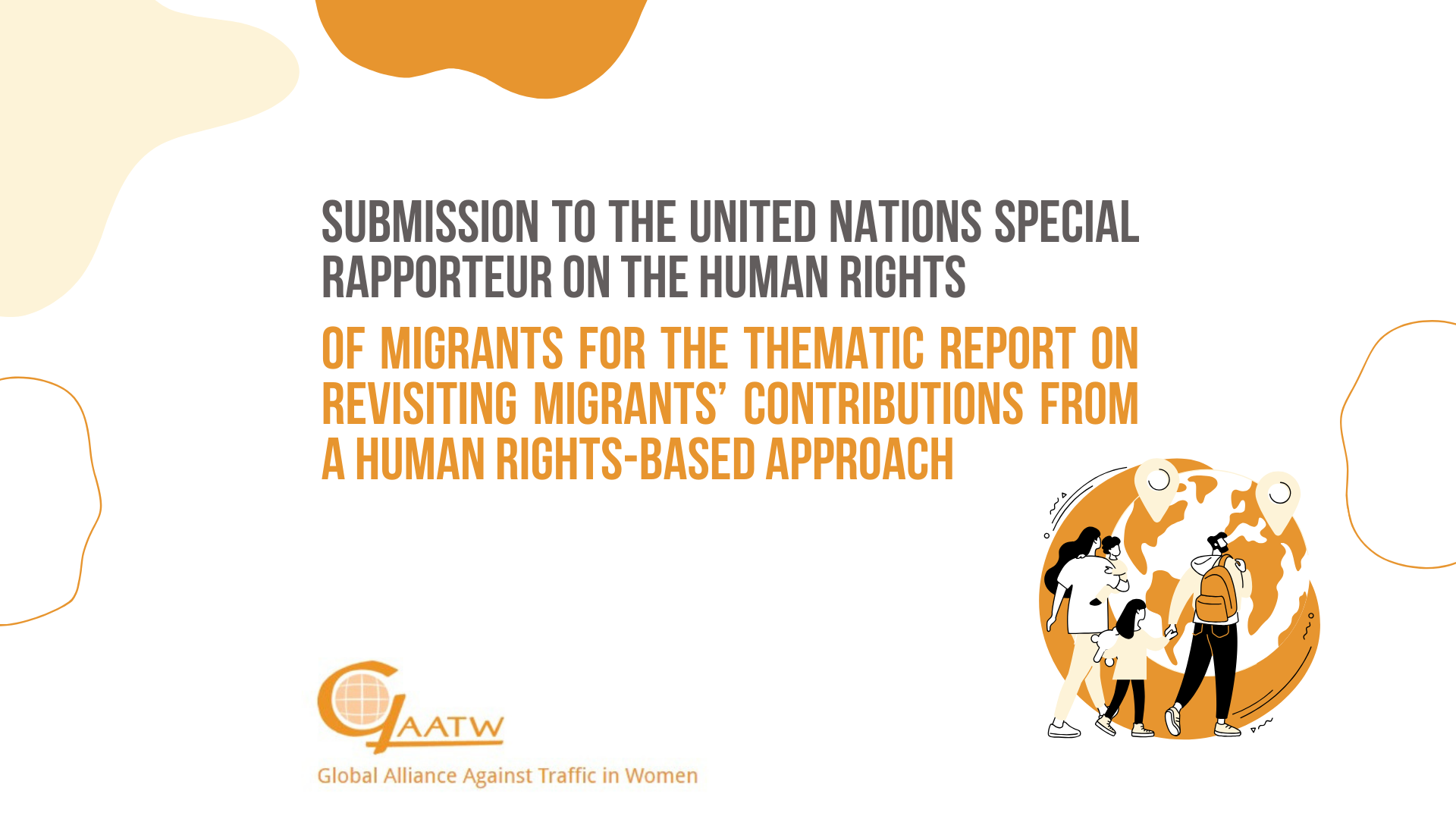Global Alliance against Traffic in Women
February 2024
About GAATW
The Global Alliance Against Traffic in Women (GAATW) is an Alliance of non-governmental organisations from Africa, Asia, Europe, and the Americas. Member organisations work to promote the rights of migrants and survivors of trafficking. The GAATW International Secretariat is based in Bangkok, Thailand and coordinates the activities of the Alliance, initiates research, and advocates on behalf of the Alliance.
Over the past three years, GAATW has interviewed a total of 970 migrants and survivors of trafficking (953 women and 17 men) in 18 countries across Europe, Asia, and the Americas. This submission is based on the findings of these conversations, as well as earlier research conducted in 2018 with self-organised groups of migrant women workers in India, Thailand, Mexico, Canada, Spain, South Africa and New Zealand.
Introduction
This submission will focus on questions 2 and 3 in the call for input. First, it will examine and analyse the ways in which the ability of migrants to self-organise facilitates greater inclusion and therefore greater freedom to contribute to society. Second, it examines how the failure of states and international organisations to implement feminist migration policies significantly hinders migrants’ contributions and increases their vulnerability to human rights violations.
In this submission, when we discuss the contributions of migrants and the challenges they face, we seek to avoid any suggestion that migrants are required to contribute either economically, socially, or culturally to be deserving of rights protection. We wish to avoid the risk that by focusing on the “contributions” of migrants, a dichotomy is inadvertently drawn between “good” migrants, who contribute to society, and “bad” migrants who do not. This risk is particularly acute for women migrants. The strict gender roles that have been ascribed to women globally perpetuate harmful stereotypes about what a woman’s contribution in life should be, which are usually linked to childrearing, sexual chastity, and caregiving. Women migrants who deviate from these stereotypes, risk being seen as not contributing in the right way and therefore as “bad” migrants.
Submissions
Question 2: What positive measures are implemented by civil society organisations and non-governmental stakeholders in maximising and optimising migrants’ contributions? If so, please provide details.
Migrants are the ultimate experts in their own lives and when migrant women are afforded the right to organise, either as civil society organisations or as workers organisations, they have been able to maximise and optimise their contributions by tackling exploitative working practices and promoting their social inclusion at home and overseas. Migrant organisations create a space for migrant people to voice their concerns, take collective action against injustice, and participate in political and social life.
For example, the emergence of an international self-organised sex worker rights movement has been hugely significant for drawing attention to the human rights abuses faced by migrant sex workers and for combatting rights violations against sex workers in the course of migration, such as human trafficking. This has greatly enhanced the contribution sex workers are able to make to their communities. From Thailand to South Africa, sex worker-led organisations have assisted migrant sex workers to challenge exploitative working practices, and have rescued and assisted victims of trafficking they identify at their places of work.1 Sex worker-led organisations have also played a key role in gaining recognition of the contribution migrant workers are making.2
Similarly, the self-organised migrant domestic workers movement has been integral to securing recognition of the contribution of migrant domestic workers at the international level (for example securing the enactment of ILO Convention 189 on Domestic Workers) and at the national level. Taking just one recent example of the ways in which self-organised groups of migrant domestic workers have maximised migrants’ contributions - in the UK, our research partner, the Voice of Domestic Workers, together with a broader coalition of self-organised domestic workers, successfully campaigned for the removal of a discriminatory exemption from minimum wage for migrant domestic workers. From 1 April 2024 all migrant domestic workers in the UK are entitled to minimum wage. This will of course increase the “contribution” to the economy and labour market of the UK being made by migrant domestic workers but, more importantly, will protect the rights of migrant domestic workers’ and enhance their sense of inclusion within society.
Self-organised groups of migrant women are also often providing vital support that strengthens the freedom of migrants to participate into society, filling the gaps left by governments. For example, in recent research carried out in Vancouver, Canada, it was identified that it is not the Government who is providing English
1 For examples see GAATW, “Sex Workers Organising for Change: Self-representation, community mobilisation, and working conditions,” 2018, pp. 33-36
2 See for example how in Mexico in 2014, Brigada Callejera and the Mexican Network of Sex Workers through coordinated protests succeeded in gaining the recognition of sex workers (many of whom are migrants) as non- salaried workers in GAATW, “Sex Workers Organising for Change: Self-representation, community mobilisation, and working conditions,” 2018, p. 37

